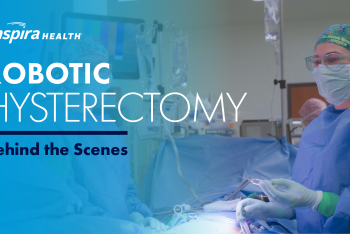Understanding the most common surgeries can help prepare patients for potential procedures. Knowing...
Read More
Improvements in technology over the years has completely changed how surgery is performed today. Open surgeries are becoming less common, and minimally invasive procedures are becoming more and more popular. But what is minimally invasive surgery, and what does it mean for patients?
“Minimally invasive procedures and robot-assisted surgeries are becoming more advanced and have wonderful benefits for patients, lowering the risk of complications and allowing patients to heal faster,” said Chase Kriza, D.O., general surgeon at Inspira Health.
“Minimally invasive surgeries are medical procedures performed through tiny incisions rather than larger cuts required in traditional open surgeries,” said Dr. Kriza. “These procedures usually involve specialized instruments like laparoscopes, endoscopes, and robotic systems.” These instruments carry miniature cameras and tools, that allow surgeons to view the operative area with precision and perform complex procedures in a less invasive way.
The benefits of minimally invasive surgeries are undeniable. Patients undergoing minimally invasive surgery have shorter recovery times, reduced pain and scarring, less blood loss, and a lower risk of complications compared to traditional open surgeries. However, not all surgeries can be performed in a minimally invasive manner. A patient’s medical condition and the complexity of the surgery are factors that may determine if minimally invasive surgery is a safe approach.
“Minimally invasive procedures are offered across various surgical fields, including general surgery, neurosurgery, orthopedics, vascular surgery, colorectal procedures, thoracic surgeries, gynecology, and urology,” said Dr. Kriza.
Some common types of minimally invasive surgeries include:
Minimally invasive surgery is progressing every day, offering patients a path to quicker recovery, reduced discomfort, and improved health outcomes.
“The thought of surgery can be scary. That’s why we take our time with each patient and encourage them to ask any questions that are on their mind,” said Dr. Kriza. “When a patient truly understands their treatment plan, it leads to a quicker and smoother road to recovery. That is always our goal.”
To learn more about minimally invasive surgeries, visit our website.

Understanding the most common surgeries can help prepare patients for potential procedures. Knowing...
Read More
Amanda Mirmanesh, D.O., is an OB/GYN at Inspira Medical Center Vineland. Follow her as she arrives...
Read More
Preparing for surgery can feel overwhelming, but there are ways to minimize your anxiety and focus...
Read More
The material set forth in this site in no way seeks to diagnose or treat illness or to serve as a substitute for professional medical care. Please speak with your health care provider if you have a health concern or if you are considering adopting any exercise program or dietary guidelines. For permission to reprint any portion of this website or to be removed from a notification list, please contact us at (856) 537-6772